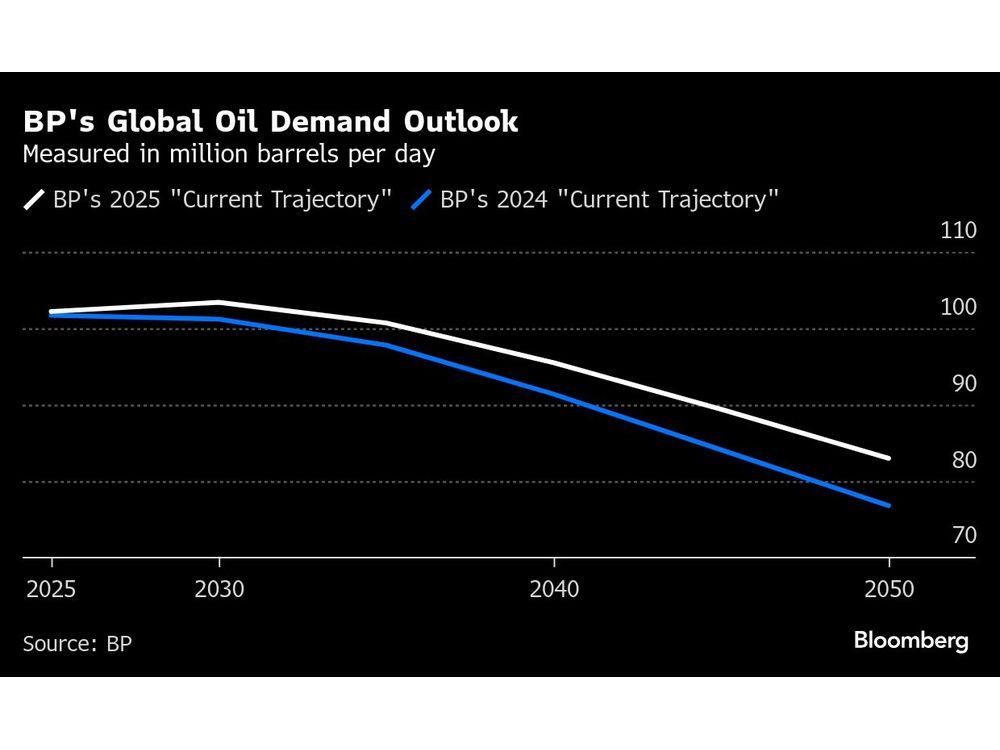Business
BP Adjusts Oil Demand Forecast, Sees Growth Through 2030

BP Plc has revised its oil demand projections, indicating that consumption will continue to rise throughout this decade. This marks a significant change from earlier estimates suggesting that demand could peak as soon as this year. The company’s annual Energy Outlook report highlights factors such as increasing consumption in emerging markets and limited gains in energy efficiency as key drivers for this trend.
The report forecasts that oil demand will reach approximately 103.4 million barrels per day by 2028, up from 102.2 million barrels per day in 2023. BP’s Chief Economist Spencer Dale and his team outlined that if current conditions persist, demand could see an additional growth of 6 million barrels per day through 2035. This shift in outlook aligns with a broader trend among oil companies, influenced by geopolitical tensions and the ongoing use of petrochemicals.
Changing Dynamics in Global Energy
The evolving landscape of energy consumption has led to a reassessment of peak oil demand. Recent political developments, including the return of former President Donald Trump, have accelerated a global move away from ambitious energy transition goals. As a result, major oil firms like BP have increasingly focused on their core fossil fuel operations. Activist investor Elliott Investment Management has also pressured BP to prioritize oil and gas production over renewable investments.
BP’s report indicated that energy efficiency improvements have been “lackluster,” contributing to the sustained demand for fossil fuels. The company anticipates that demand will stabilize around current levels by 2035. BP is not alone in adjusting its perspective; the International Energy Agency (IEA) is expected to release a report this year stating that oil and gas demand will continue to increase beyond this decade, contrary to earlier forecasts.
According to a draft report from the IEA, fossil fuel usage is projected to rise until 2050. BP’s analysis suggests that oil consumption could reach around 83 million barrels per day by 2050, compared to last year’s estimate of approximately 75 million barrels per day. Additionally, the demand for natural gas is expected to increase significantly, particularly due to growing imports in Asia.
The Role of Technology and Policy
Emerging technologies are also influencing energy consumption patterns. Notably, BP has identified a surge in electricity demand from data centers, estimating that this sector will account for around 10% of global power demand growth through 2035, and approximately 40% of growth in the United States. The company emphasized the uncertainty surrounding these projections, largely due to rapid advancements in chip and cooling technologies.
In recent years, BP has faced challenges with its renewable energy investments, leading to a strategic reset in its approach. The firm is now refocusing on oil and gas, seeking to enhance its performance in these sectors. The report further underscores that the future use of biofuels, hydrogen, and carbon capture technologies will largely depend on government policies and regulations.
Overall, BP’s adjusted outlook reflects a significant shift in the energy landscape as the company navigates the challenges and opportunities presented by global demand for oil and gas.
-

 Science4 months ago
Science4 months agoToyoake City Proposes Daily Two-Hour Smartphone Use Limit
-

 Health4 months ago
Health4 months agoB.C. Review Reveals Urgent Need for Rare-Disease Drug Reforms
-

 Top Stories4 months ago
Top Stories4 months agoPedestrian Fatally Injured in Esquimalt Collision on August 14
-

 Technology4 months ago
Technology4 months agoDark Adventure Game “Bye Sweet Carole” Set for October Release
-

 World4 months ago
World4 months agoJimmy Lai’s Defense Challenges Charges Under National Security Law
-

 Lifestyle4 months ago
Lifestyle4 months agoVictoria’s Pop-Up Shop Shines Light on B.C.’s Wolf Cull
-

 Technology4 months ago
Technology4 months agoKonami Revives Iconic Metal Gear Solid Delta Ahead of Release
-

 Technology4 months ago
Technology4 months agoApple Expands Self-Service Repair Program to Canada
-

 Technology4 months ago
Technology4 months agoSnapmaker U1 Color 3D Printer Redefines Speed and Sustainability
-

 Technology4 months ago
Technology4 months agoAION Folding Knife: Redefining EDC Design with Premium Materials
-

 Technology4 months ago
Technology4 months agoSolve Today’s Wordle Challenge: Hints and Answer for August 19
-

 Business4 months ago
Business4 months agoGordon Murray Automotive Unveils S1 LM and Le Mans GTR at Monterey









